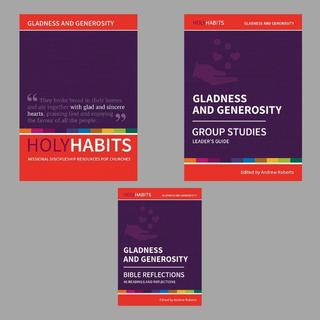In the latest of our series of articles on gladness and generosity, Holy Habits founder Andrew Roberts asks why it can be so hard to receive generosity.
30 October 2022
When my friend Hendry was visiting a remote area of a far eastern country, his gladness and generosity were tested when his hosts placed before him a snake, a flying fox (squirrel) and an iguana to eat. He was very tempted to say that he was vegetarian, but being the gracious man that he is and recognising the generosity of his hosts, he consumed the local delicacies.
‘Generosity received releases gladness.’
Receiving generosity is not always easy. One of the most poignant examples of this involves Peter struggling to receive the generosity of Jesus in John 13. As Jesus kneels before him Peter cries out ‘You will never wash my feet’ (John 13:8, NRSV). Quite why he reacted in this way is not clear in the dialogue. Was it pride getting in the way? Or embarrassment? Or misunderstanding? To his credit, Peter relents when Jesus explains the significance and depth of what he is doing. Having overcome his embarrassment, pride or misunderstanding, Peter then gets a bit carried away and asks to have his hands and head washed as well. Generosity received releases gladness.
[Jesus] poured water into a basin and began to wash the disciples’ feet and to wipe them with the towel that was tied around him. He came to Simon Peter, who said to him, ‘Lord, are you going to wash my feet?’ Jesus answered, ‘You do not know now what I am doing, but later you will understand.’ Peter said to him, ‘You will never wash my feet.’ Jesus answered, ‘Unless I wash you, you have no share with me.’ Simon Peter said to him, ‘Lord, not my feet only but also my hands and my head!’
John 13:5–9, NRSV
Jesus our exemplar
As ever, Jesus is our exemplar when it comes to living with gladness and generosity. One chapter earlier in John’s gospel (John 12:1–8) we have the powerful, beautiful and inspiring story of Mary (the sister of Martha) anointing Jesus’ feet with an expensive perfume made of pure nard. It is an extraordinarily generous act and one that Jesus is deeply moved by. When Judas is critical of her extravagance, Jesus’ response is swift, welcoming what Mary has done and explaining the significance of her generosity.
‘When Judas is critical of Mary’s extravagance, Jesus’ response is swift, welcoming what she has done and explaining the significance of her generosity.’
I expect that it is unlikely that you or I will have anyone pour expensive perfume over our feet, but it is likely that every now and then we will be the recipients of offers of generous gifts or acts of kindness. So how do we respond?
Practice a different way
Writing on her Chair’s Travels Facebook page, Rachel Parkinson (chair of the Wolverhampton and Shrewsbury Methodist District) said this in a very helpful piece:
I’ve realised that my knee-jerk reaction to spontaneous generosity is to turn it down. This week I’ve been practising a different way.
Shared with Rachel’s permission
‘No thank you’
I say
to the torch, the blanket
the coffee
the spare room for a night.
‘I don’t want to put you to any bother’
I say
as I think
‘This might get awkward’
And so
I deny myself
light, warmth, refreshment, shelter.
I deny you
the spontaneous joy of gifting.
I deny us
the adventure of encounter –
the chance to meet Christ as both
host and guest.
Just as well
that this time I said
‘Yes please!’
Tragically, in these economically very tough times, for many receiving generosity in the provision of the basic necessities of life is no longer a matter of choice. To receive the generosity of others through the services of a foodbank or a warm church is not at all easy. Like Peter, we might feel deeply embarrassed to need to receive such a service. We like the grace of giving but struggle with the grace of receiving. But as Jesus our exemplar shows, there is no shame in being the recipient of generosity.
‘I’ve realised that my knee-jerk reaction to spontaneous generosity is to turn it down. This week I’ve been practising a different way.’ – Rachel Parkinson
When Peter didn’t want his feet washed, Jesus said ‘Unless I wash you, you have no share with me’ (John 13:8, NRSV).’ Maybe receiving generosity is one way in which we share in the incarnational life and ministry of Jesus, who, as Rachel points out, was both host and guest, giver and receiver of grace. And maybe this mutuality of need and provision, giving and receiving is part of what holiness and wholeness are all about.

Andrew Roberts is a husband, father, minister, writer and speaker. He is the author of the book Holy Habits (Malcolm Down Publishing, 2016) and co-editor of the BRF Holy Habits resource booklets.

Developed from Andrew Roberts’ master’s studies at Durham University and his book of the same name, Holy Habits is based on the ten key habits or practices we see in Acts 2:42–47. It’s a way of life for all ages and cultures that nurtures whole-life, missional discipleship; a way of life that, when lived faithfully day by day and fruitfully both personally and collectively, encourages others to join the adventure of following Jesus.

Find out more about Holy Habits resources, including group study guides and Bible reflections on each of the ten habits.

Our fabulous new range of Christmas Cards for 2022 is now available to order online, along with gift wrap and everyday cards.
